Belief in a spiritual realm beyond the physical world remains very common among U.S. adults, the 2023-24 Religious Landscape Study (RLS) finds.
Roughly eight-in-ten Americans believe “there is something spiritual beyond the natural world, even if we cannot see it.” Similar or slightly larger numbers say they believe that God or a universal spirit exists (83%), and that humans have a soul or spirit in addition to a physical body (86%).
Large majorities of Christians and Muslims hold each of these beliefs, as do more than half of all Buddhists, Hindus, Jews and religiously unaffiliated adults.
Belief in heaven and belief in hell are less widespread, but still held by most Americans, including most Christians and Muslims.
In addition, Americans across religious categories – including most religiously unaffiliated adults – say they have spent at least some time in recent years thinking about God and religion.
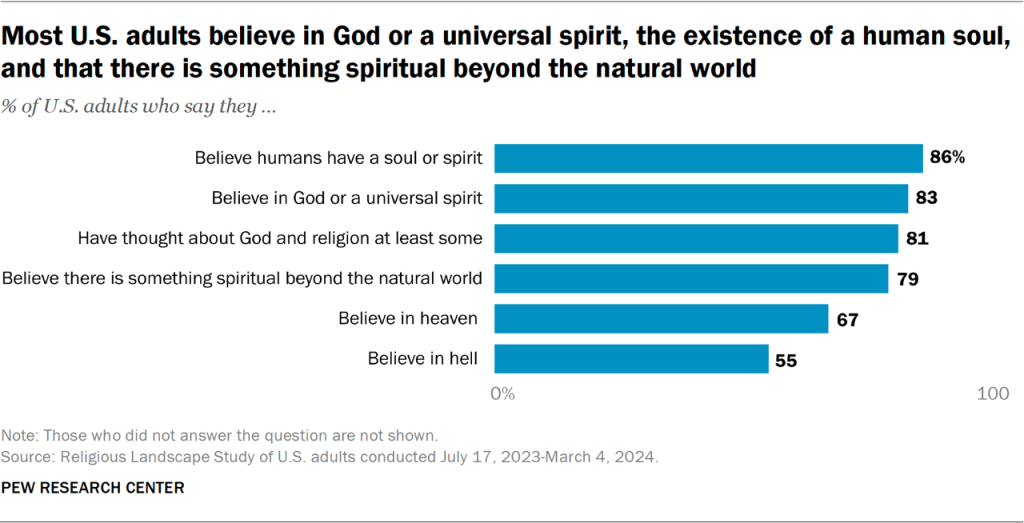
Over the years, Americans overall have become slightly less likely to believe in heaven or hell, or to believe in God or a universal spirit with absolute certainty. This partly reflects the fact that religiously unaffiliated adults – those who identify as atheist, agnostic or “nothing in particular” – make up a growing share of the population, and they are less likely than other groups to hold these types of beliefs.
The survey also asked about human evolution. Most U.S. adults believe that humans have evolved over time, including 33% who say that God had no role in human evolution, and 47% who say that humans have evolved due to processes that were guided or allowed by God or a higher power. A smaller share of the public (17%) believes humans have existed in their present form since the beginning of time.
Read on for specific religious groups’ beliefs about:
- Something spiritual beyond the natural world
- Human souls
- Belief in heaven
- Belief in hell
- Belief in God
- Human evolution
- Thinking about God and religion
Something spiritual beyond the natural world
A large majority of Americans (79%) believe there is something spiritual beyond the natural world, even if we can’t see it. Far fewer (19%) say they believe the natural world is all there is.
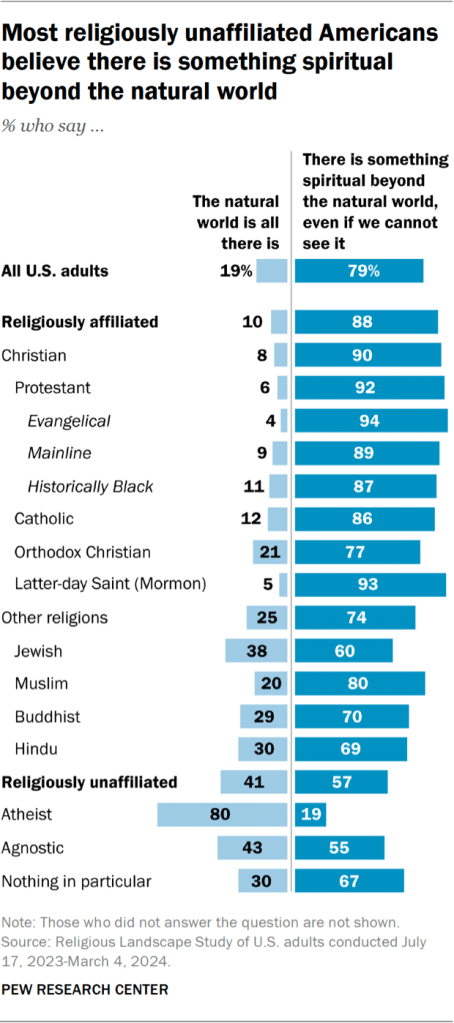
Nine-in-ten Christians say they believe in something beyond the natural world, including 93% of members of the Church of Jesus Christ of Latter-day Saints (widely known as Mormons), 92% of Protestants, 86% of Catholics and 77% of Orthodox Christians.
Of the non-Christian religious groups we analyzed, Muslims are the most likely to believe there is something spiritual beyond the natural world: 80% say this, compared with smaller majorities of Buddhists (70%), Hindus (69%) and Jews (60%).
Among Americans who are religiously unaffiliated, there is a wide range of views. The vast majority of self-described atheists (80%) say the natural world is all there is, though 19% say there is something spiritual beyond the natural world. Two-thirds of Americans who describe their religious identity as “nothing in particular” and 55% of agnostics believe in something beyond the natural world.
Human souls
The vast majority of Americans (86%) believe that humans have a soul or spirit in addition to their physical bodies. This view is held by nearly all Christians (95%) along with 90% of Buddhists and 88% of Muslims. Large majorities of Hindus (84%), people who say their religion is “nothing in particular” (79%), Jews (74%) and agnostics (67%) also believe that humans have a soul.
Again, atheists stand out from other religiously unaffiliated adults: Just one-third of atheists say they believe that humans have a soul.
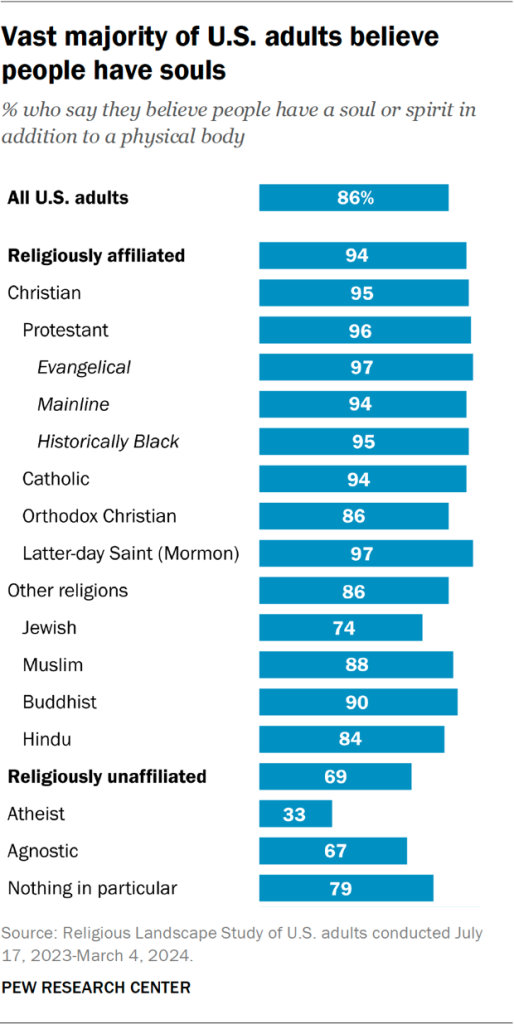
Belief in heaven
Most Americans say they think there is a heaven “where people who have led good lives are eternally rewarded.”
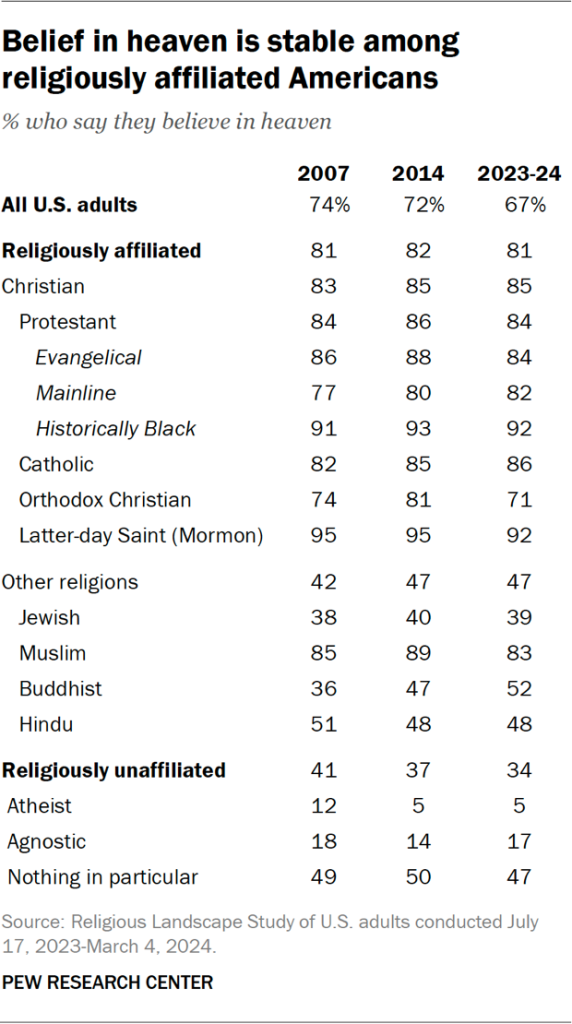
Among Americans who are affiliated with a religion, the share who believe in heaven has been stable since 2007.56
However, the share of all U.S. adults who believe in heaven has declined. This is driven partly by the growing segment of Americans who describe themselves as atheist or agnostic, or who say their religion is “nothing in particular.” These religious “nones” have become less likely to believe in heaven since 2007, even as their ranks have grown.
Belief in heaven, as defined in the survey, is most common among Christians (85%) and Muslims (83%). It is less common among Buddhists (52%), Hindus (48%) and Jews (39%).
Nearly half of adults who describe themselves as having no particular religion say they think there is a heaven where people who have led good lives are eternally rewarded, as do 17% of agnostics and a relatively small share of atheists (5%).
Belief in hell
The survey also asked about the existence of a hell “where people who have led bad lives, and die without being sorry, are eternally punished.”
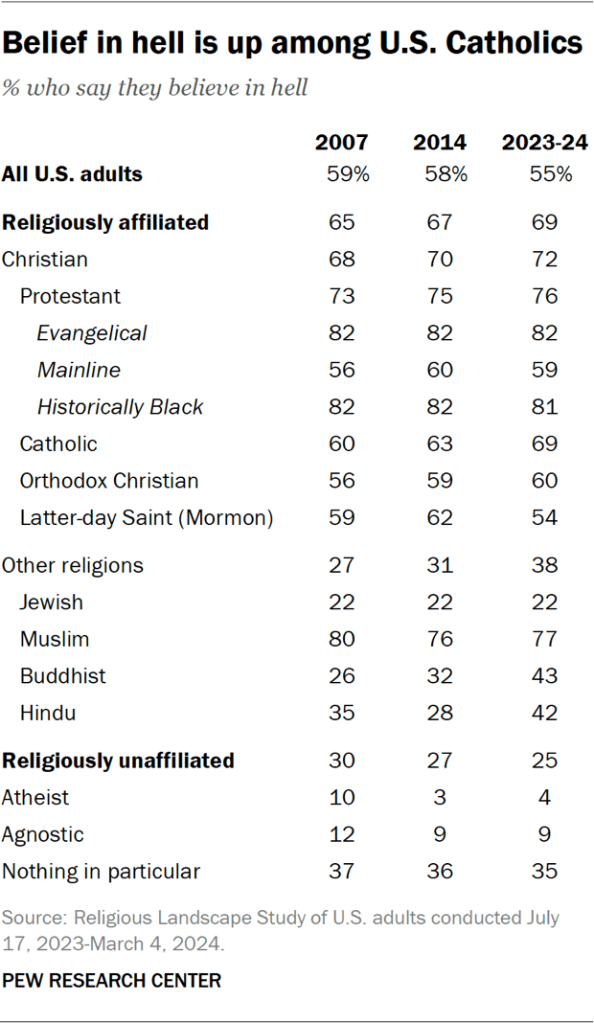
Belief in hell is somewhat less common than belief in heaven (55% vs. 67%). But the share of religiously affiliated Americans who believe in hell has ticked up slightly over the years.
Belief in hell is most common among evangelical Protestants (82%), members of historically Black Protestant traditions (81%) and Muslims (77%). Somewhat smaller shares of Catholics (69%), Orthodox Christians (60%), mainline Protestants (59%) and Latter-day Saints (54%) say they believe in hell.
In contrast, 43% of Buddhists and 42% of Hindus surveyed say they believe in hell as defined in the survey, as do 25% of religiously unaffiliated adults and 22% of Jews.
Belief in God
Most Americans believe in God or a universal spirit, and slightly more than half of all U.S. adults say they are absolutely certain in this belief.
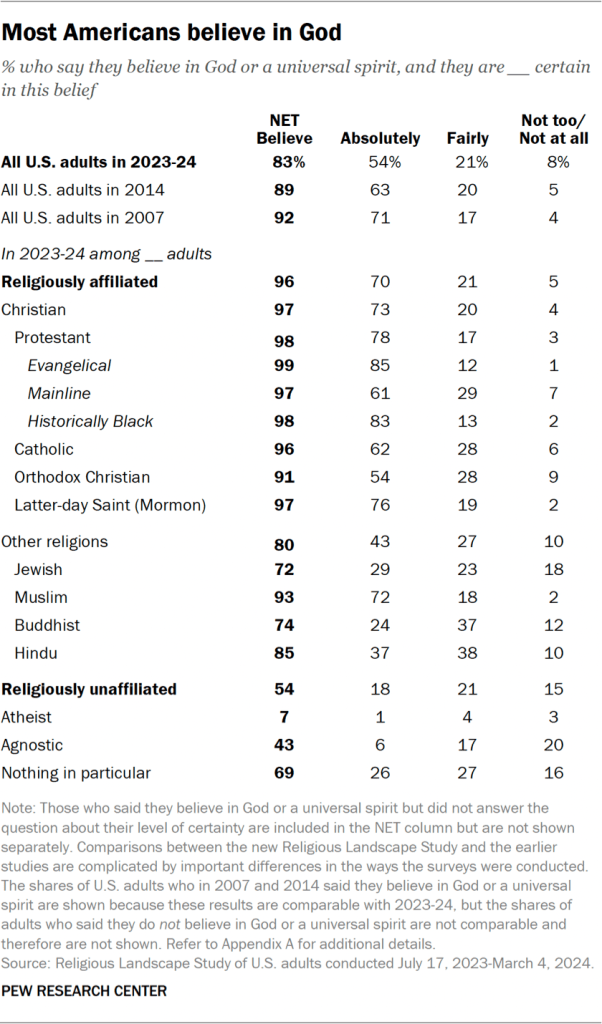
As in our past surveys, the vast majority of Christians (97%) and Muslims (93%) say they believe in God, and most people in these religious groups express this belief with absolute certainty.
Belief in God is less universal, but still fairly common, among Hindus (85%), Buddhists (74%) and Jews (72%).
Even among religiously unaffiliated Americans, more than half say they believe in God or a universal spirit. This view is partly driven by the 69% of adults who say their religion is “nothing in particular.” In comparison, 43% of agnostics and 7% of atheists hold this view.
Belief in God over time
The share of U.S. adults who believe in God or a universal spirit has declined over time, and the share who hold this belief with absolute certainty has declined even more.57
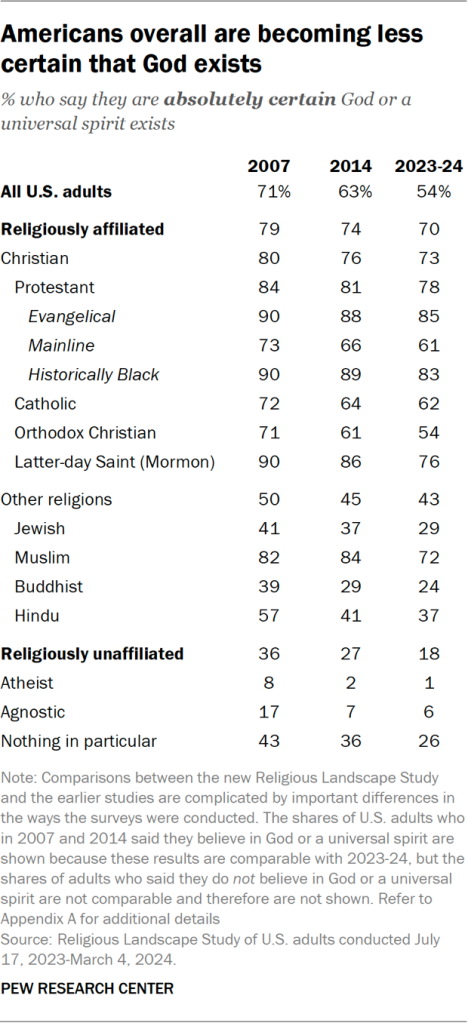
Today, 83% of U.S. adults believe in God (9 percentage points less than in 2007). And 54% of U.S. adults believe in God with absolute certainty (17 points less than in 2007).
Since 2007, most religiously affiliated groups have seen a decline in the share who are certain that God exists. For example, the share of Christians who say they are absolutely certain that God exists has ticked down from 80% in 2007, to 76% in 2014, to 73% in 2023-24.
Don’t believe in God
Relatively few U.S. adults are absolutely certain that God does not exist.
Atheists stand out as an exception. Not only do the vast majority of atheists reject belief in God or a universal spirit, but at least half also say they are absolutely certain in this belief.
The new survey’s estimate of the share of Americans who don’t believe in God or a universal spirit cannot be directly compared with results from our previous religious landscape studies. That’s because the new survey was conducted mainly online and on paper, whereas both the 2007 RLS and the 2014 RLS were conducted by telephone.
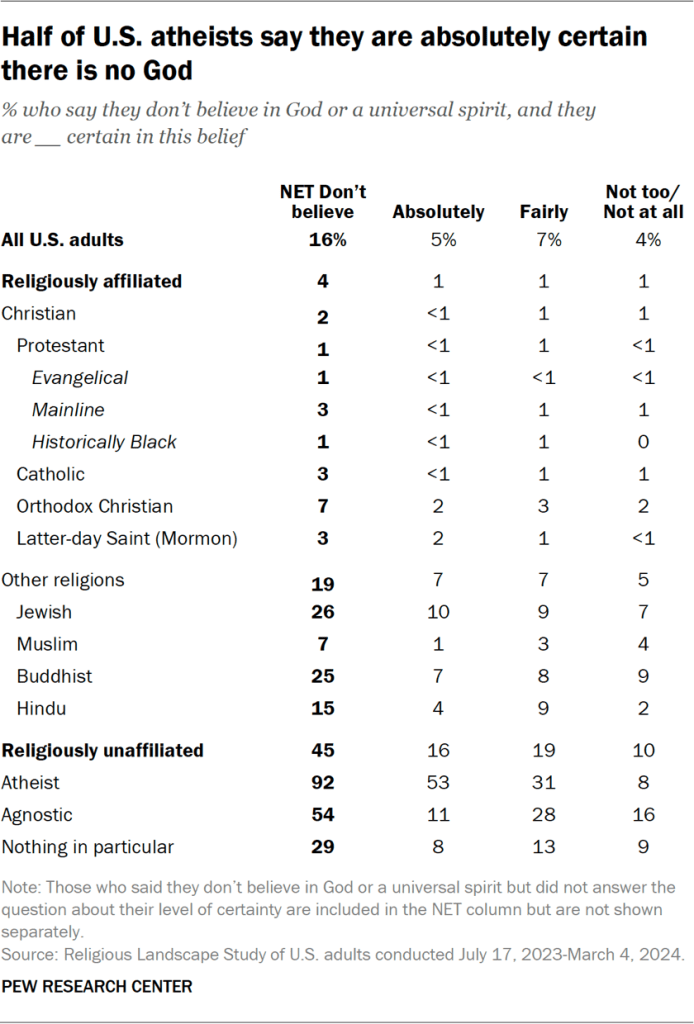
We conducted a telephone “bridge study” (for testing purposes only) to gauge the impact of this mode switch. Compared with respondents in the telephone bridge study, respondents in the main survey (conducted mainly online or on paper) were more likely to say they don’t believe in God. So the estimate of the share of people who don’t believe in God or a universal spirit in the new survey cannot be directly compared with the previous results. (Refer to Appendix A for additional details.)
However, both the 2023-24 RLS and the companion bridge study suggest that nonbelief has risen since 2007. The upshot is that we can be confident that the share of Americans who do not believe in God is higher than it was in 2007, but we cannot say by exactly how much.
(These “mode differences” are smaller in the “Yes, believe in God or a universal spirit” category. Additional details are provided in Appendix A.)
Human evolution
When asked about evolution, U.S. adults most commonly say that humans have evolved over time due to processes that were guided or allowed by God or a higher power.58
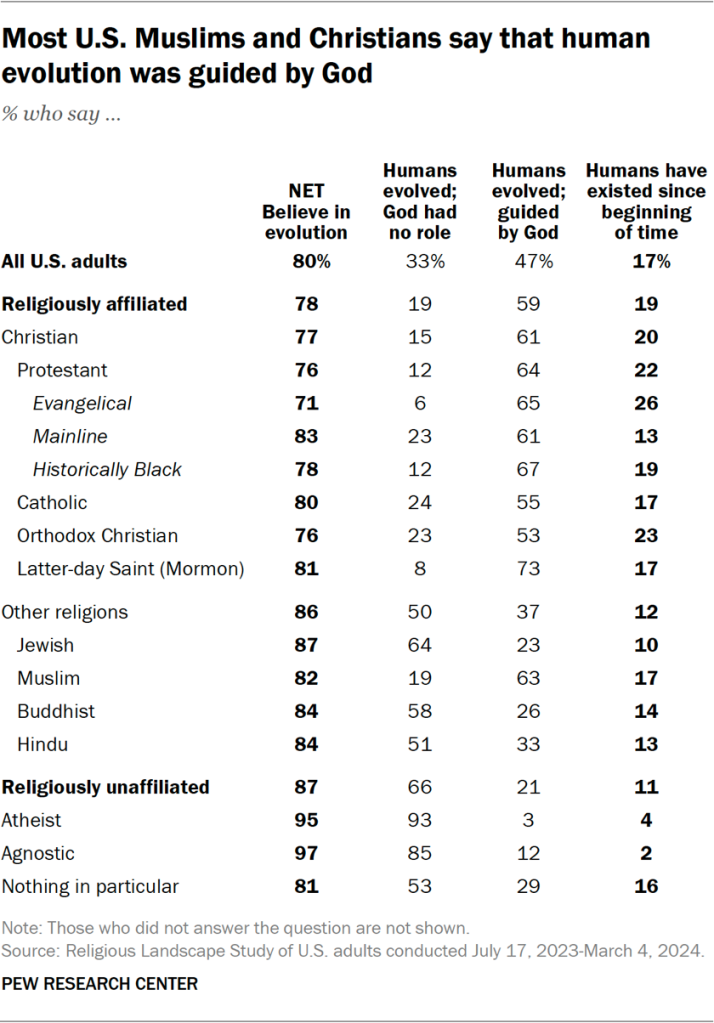
The view that evolution has been guided or allowed by God is held by 47% of U.S. adults, including most Muslims (63%) and Christians (61%).
On the other hand, one-third of adults believe that humans have evolved over time due to processes such as natural selection and that God or a higher power had no role in this process.
This view is held by most Jews (64%), Buddhists (58%) and religiously unaffiliated adults (66%), as well as by roughly half of all Hindus.
Very few evangelical Protestants (6%) or members of historically Black Protestant churches (12%) believe humans evolved without involvement from God.
Some Americans believe that humans have not evolved – that they have existed in their present form since the beginning of time. This view is held by 17% of U.S. adults, including 10% or more of all the groups in this analysis except for atheists and agnostics. Notably, about a quarter of evangelical Protestants (26%) and Orthodox Christians (23%) say humans have existed in their present form since the beginning of time.
Thinking about God and religion
Nearly two-thirds of Americans say they have thought about God and religion a great deal or quite a bit in recent years.
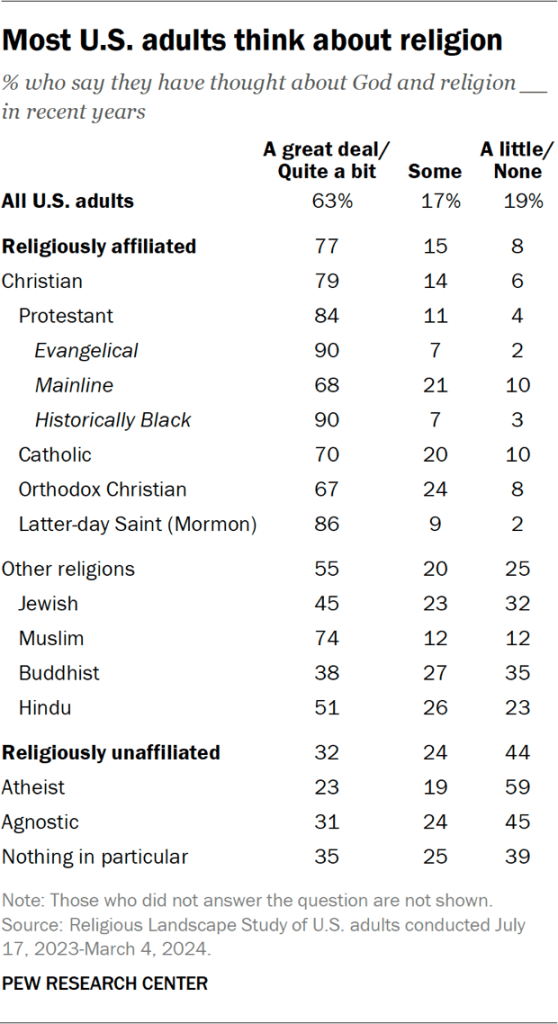
This includes the vast majority of evangelical Protestants (90%) and members of the historically Black Protestant tradition (90%), as well as 86% of Latter-day Saints.
Smaller shares of people in other U.S. religious groups also say they’ve thought about God and religion quite a bit or a great deal. This includes 68% of mainline Protestants, 70% of Catholics and 74% of Muslims.
Among religious groups in this analysis, around half or fewer of Hindus, Jews and Buddhists say they have thought about God and religion either a great deal or quite a bit.
Religiously unaffiliated adults are among the least likely to say they think about God and religion, but 56% say they have thought at least some about these topics. Atheists are the only group in which most adults say they have given little or no thought to God and religion in recent years.




